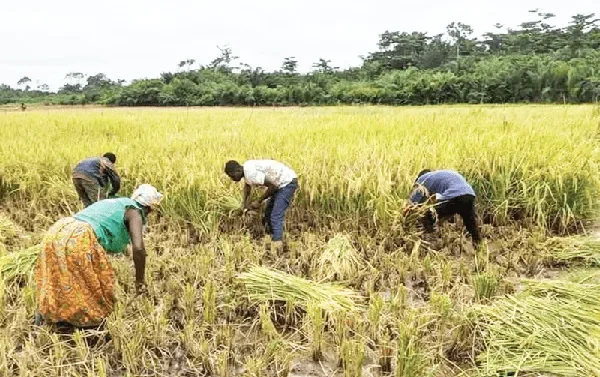The General Agriculture Workers Union (GAWU) has raised alarm about the growing issue of illegal importation of rice into Ghana. Despite official reports showing a decline in rice imports over the last three years, market conditions suggest otherwise.
GAWU reports that large quantities of foreign rice, primarily from neighboring countries like Togo, Côte d’Ivoire, and Burkina Faso, are being smuggled into Ghana through unapproved routes, bypassing legal channels and tariffs.
Surge in Illegal Rice Imports
GAWU’s General Secretary, Edward Kareweh, highlighted that these illegal imports are undercutting locally produced rice.
The foreign rice, often priced 20% to 30% cheaper than locally grown varieties, creates an unfair advantage in the market. This price disparity threatens to suffocate the local rice industry, as domestic producers struggle to compete with the influx of cheaper, illegal imports.
The illegal importation of rice undermines efforts to promote local production and stalls the growth of the domestic market.
Economic Impacts and Statistics
President Nana Akufo-Addo, during his State of the Nation Address on February 27, 2024, reported a significant decrease in official rice imports over the past few years.
In 2021, Ghana imported 805,000 metric tonnes of rice, which fell to 650,000 metric tonnes in 2022 and further dropped to 440,000 metric tonnes in 2023.
This reflects a 45% reduction in imports over three years. Despite this, illegal rice imports continue to infiltrate the market at alarming rates, negating any potential benefits of the decline in official imports.
Challenges for Local Producers
Local rice farmers, especially in northern Ghana, are facing immense challenges due to the illegal importation of rice. Farmers in regions like Savelugu are unable to find buyers for their harvested rice, with some rice mills facing closure due to lack of demand.
While the government has pushed for reduced rice imports to boost local production, the illegal influx of foreign rice fills the gap, preventing local producers from benefiting.
The consequences of the illegal importation of rice extend beyond the economic realm.
The local rice industry employs thousands of farmers, millers, and distributors. The collapse of this sector would result in significant job losses, further impacting the economy.
Policy and Regulation
Efforts to curb the illegal importation of rice must include stricter border controls and better enforcement of trade regulations.
GAWU has called for immediate action to protect the local rice industry, urging the government to work closely with law enforcement to identify and block the unapproved routes used for smuggling.
To address the issue, the government needs to invest in the local rice production supply chain, ensure that locally grown rice is competitively priced, and implement policies that encourage consumers to buy local rice.
Additionally, boosting the capacity of local rice mills and improving market access for farmers can help reduce the dependency on foreign rice.
Conclusion
The surge in illegal importation of rice presents a serious threat to Ghana’s rice industry. Although official statistics show a reduction in rice imports, the continued smuggling of cheaper foreign rice undermines local production and the livelihoods of farmers.
Strengthening border controls, promoting local rice consumption, and investing in the domestic rice industry are critical steps needed to address this growing issue.
By taking swift action, Ghana can protect its local producers and ensure a more competitive and resilient rice market, reducing the impact of illegal importation of rice.






















